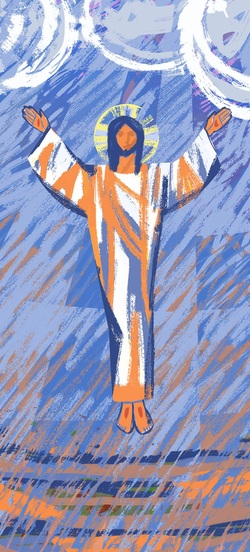
- Alan Menken & Stephen Schwartz
Reading:
Thus says the LORD: Maintain justice, and do what is right, for soon my salvation will come, and my deliverance be revealed. And the foreigners who join themselves to the LORD, to minister to him, to love the name of the LORD, and to be his servants, all who keep the sabbath, and do not profane it, and hold fast my covenant-- these I will bring to my holy mountain, and make them joyful in my house of prayer; their burnt offerings and their sacrifices will be accepted on my altar; for my house shall be called a house of prayer for all peoples. Thus says the Lord GOD, who gathers the outcasts of Israel, I will gather others to them besides those already gathered.
- Isaiah 56.1, 6-8
Reflection:
Some two years after I defended my doctoral dissertation – just when I had begun to forget the agony of the experience and recover from the intellectual aches and pains inevitably identified with graduate study – some two years after I defended my dissertation, I learned that I had gone about it the wrong way! Oh brother! I learned that I had martyred myself beneath a heavy weight of research and writing, when the central question I posed comes with a ready made, simple answer. Jeez! Say it ain’t so.
Long story short, in my dissertation I compared the notion of salvation in the Bhagavad Gita and the Gospel of John. When I presented a paper at a professional conference two years later, a prim and proper New Testament professor informed me that the entire edifice of my work was bogus, because the Greek notion of salvation that underlies John is absent from the Gita, as is the reality of salvation itself. Wow! I explained that I had used the word salvation in my title in a general sense; as shorthand for the ultimate fulfillment of life, but since the title was already too long (you don’t even wanna know), I used the word salvation.
Upon reflection, however, I realized that my colleague had gone way beyond semantics (she probably knew the Gita is in Sanskrit) and had submitted the Gita and the faith tradition it represents to a litmus test determined by Christian doctrine… and found it wanting. I realized that she had oversimplified a complex and nuanced notion – life’s fulfillment – and managed to dismiss one of the great spiritual traditions of human history at the same time.
I share this story because it occurs to me that we are all in the habit of seeking the simplest possible answers to life’s questions – a habit illustrated so very well by my colleague - and inevitably finding that the correct answer is simple… and it’s my answer. For example, ask most any Christian what salvation means, and she or he is likely to say something like, “Going to heaven when I die.” Now, I won’t argue with that; shoot, I am really looking forward to the fulfillment of my life in union with God. I would quickly add, however, that salvation is so much more than ultimate destiny, and that it refers to God in the present tense at least as much as in the future sense; God as present reality, not just future savior. I would contend that God has our back, and this frees us to explore and enjoy the present reality of that which we call salvation.
And it ain’t just about me and Jesus either. Salvation is given expression – I would say reality – in compassion; in reaching out to others in need; to other children of God who could use a little salvation. Otherwise stated, God is saving us (present progressive tense) through the very act of reaching out to and accepting others. I’m not advocating some form of salvation through works, but I am saying in no uncertain terms that we are all in this together; that salvation is lived out in compassionate relationships.
Isaiah glimpsed something of this. Notice how the notion of deliverance, of God’s salvation, is revealed in this passage as embracing others – the foreigner (read non-Christian) and outcasts - accepting and affirming them as God’s other children. All of these will be invited to God’s holy mountain, and to God’s house of joy that shall be called a house of prayer for all peoples.
Wow! What a wonderfully rich and nuanced notion is this thing we call salvation. And we haven’t even gotten to the Gita. Don’t worry; I’m not going there. But I will go so far as to propose that we share the prayer of Esmeralda in the Disney animated version of The Hunchback of Notre Dame, that God will help the outcasts, the lost and forgotten who look to God for compassion. Because if God doesn’t help them, she says, nobody will. To which I respond, “Is nobody home?”





 RSS Feed
RSS Feed



